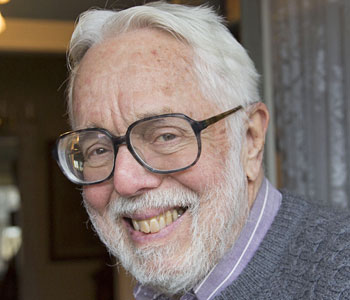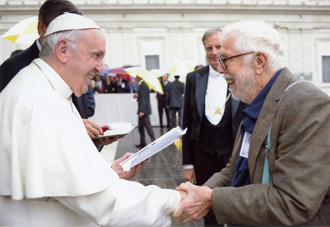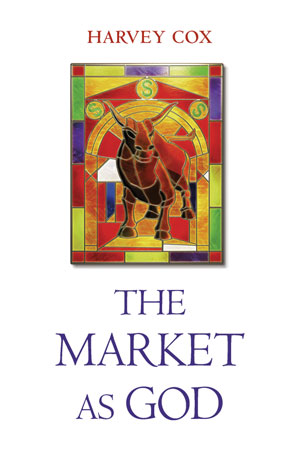
The global capitalist=consumerist economy has an entire faith system, which has its own hierarchy, its own institutions, its own marble palaces. It has its own mythology, doctrine of the creation, doctrine of the Fall, doctrine of redemption, even a kind of eschatology, where history is going where it ought to be going – all interpreted and presented in terms of a consumer capitalist economy. It has its own heretics, its own schisms. It encourages us to trust in the god of the system: to trust, even though the god of the economic system doesn’t seem to know what he is doing at times, when things go very wrong. But we are still supposed to trust that in the long run the wisdom of this market god will make things right. There is an old American religious song called “Farther along we will understand why.” There may be a mystery now that the trickle-down theory of economics is not reaching everyone, as Pope Francis reminds us, but if we only wait, if we are only patient, in the long run the market knows best. In other words, to use a term taken directly from theology, the market is omniscient.
It may not appear omniscient, but it certainly claims to be. So we must have confidence that it is omniscient. So I am talking about an entire symbol system here, of myths and stories and narratives, that are parallel to but very different from those of traditional religions such as Christianity or Judaism or Islam – very different and in some ways contradictory.
The book deals with economic history in conjunction with religious history, and the interaction of the two. I use the capitalized Market to indicate a market system that has exceeded its proper place and function, has become a function "god." I refer to Pope Francis’s Gaudium Evangelii in which he refers to a "deified market." And I draw on the classic work of R.H. Tawney, Religion and the Rise of Capitalism. As a theologian and a student of both Reinhold Niebuhr and Paul Tillich, I became interested a few years ago in the religious functions the Market now seems to fulfill. The Pope calls it a "new golden calf" and an idolatry.
In a recent interview, I told Masao Yokota that Pope Francis, in saying that the problem is the “deified market,” is saying that we are under the power of another kind of religious or world view, which is consumer capitalism and accumulation and competition. We are living in a world view, in which we are set against each other. The market as god sets standards, provides narratives, creates values, gives us our notion of who we are and how much we are worth. All these things are now dictated by this all powerful market. Everybody talks about the market as though it’s God: “The market really knows best.” If the Dow Jones looks bad today, “the market will eventually sort things out.” It’s like a god.
In the same interview, we also talked about taking action. In responding to the market mentality or the ersatz religion of the market, it doesn’t do a whole lot of good just to talk about it. Pope Francis also shows what it would be like to live in a way when you are not captured by the deified market. He wouldn’t live in the pope’s palace. He lives in the guest hotel. I’ve been there myself in the guest hotel in the Vatican. He eats with other people. He simply refuses to take advantage of his position to live the high style the way many popes in the past have. He is exemplifying. By the way, in October 2016 I had the honor of presenting The Market as God to the pope at an audience in Rome, and it was quite an honor for me.

I would hope that the bookstore browser would look at the introduction. It sums up what the book is about. I would also recommend the chapters on holidays, on the similar crises religions and economic systems experience, and perhaps my two chapters on Adam Smith. The last chapter gives some idea of how we can move ahead. I do not recommend abolishing the Market but returning it to its proper place. Here I use the old theological formula of "restitutio humanii," the restitution of humankind to its proper place in the scheme of creation. I suggest that the Market is not well suited to being a god and that it might be happier to be relieved of the burden!
My hope is that this book will help open a new and fruitful conversation between religion and economics. There have been times in the past in which such a conversation did occur, but it has lapsed in recent decades, to the detriment of both sides. For example, there is a long history of the ethical/theological issue of usury and interest, a topic we could usefully explore more in an age of predatory interest and loan-sharking.
The book grew out of a course I taught for a few years here at Harvard called "God and Money" in which students from several divisions of the university took part, including – very importantly – some from the Business School here who told me they wished these kinds of things had a more visible place in their own curriculum. The book has been reviewed in The Financial Times and in Forbes, so it is garnering some interest in the business community. I hope this signals that a renewed and productive conversation may be welcomed.


Harvey Cox has, as the Nation worded it recently, “played a profound role in shaping liberal Christianity in America.” Besides The Market As God, featured in his Rorotoko interview, as well as numerous other writings, Cox is the author of the internationally influential Secular City (1965) and How to Read the Bible (2015). With a distinguished career that spans over half a century of scholarship, teaching, and preaching, Cox is now Hollis Professor of Divinity Emeritus at Harvard University.